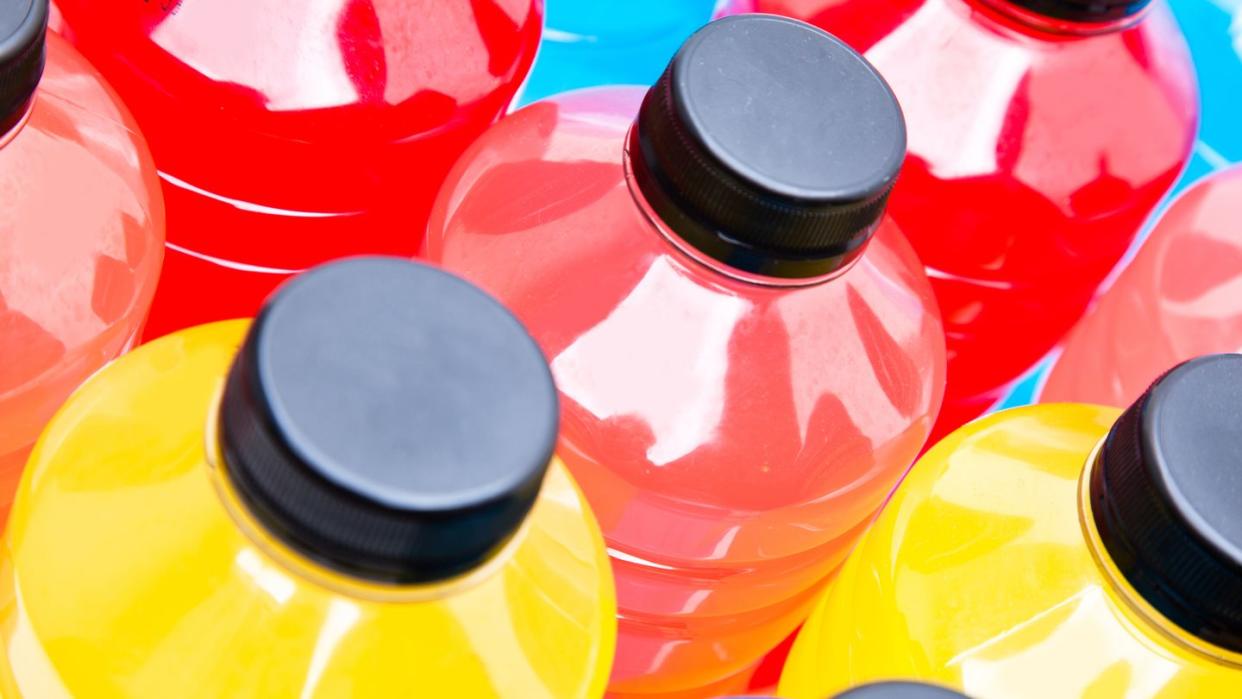Yes, There Is Such A Thing As Too Many Electrolytes

"Hearst Magazines and Yahoo may earn commission or revenue on some items through these links."
If you've ever seen a commercial for a sports drinks, you've probably heard of electrolytes. Often discussed alongside hydration, electrolytes are known for their role in balancing fluids in the body. But there's so much more to these electrically charged substances—and a lot that people get wrong about them. Electrolytes are essential to key body functions and maintaining overall balance, but what are they, exactly?
We got in touch with Amy Stephens, a registered dietician who specializes in sports nutrition and eating disorders, to help us demystify electrolytes and hydration.
What Are Electrolytes?
There are several electrolytes in the body, but the main ones include the minerals sodium, potassium, calcium, chloride, and magnesium. They work at a cellular level to regulate blood pressure, make muscles contract, balance fluid in cells, and much more.
So what do they have to do with hydration? While electrolytes help balance fluid in the body, they are also released through fluids like sweat, diarrhea, and vomiting. If you lost a significant amount of fluids during vigorous exercise or an illness, odds are you need to replenish both water and electrolytes.
Side Effects Of An Electrolyte Imbalance
Electrolytes are responsible for many processes in the body, so too much or too little of any one of them could potentially have consequences. Perhaps the most well-known source of the electrolyte potassium is a banana. Too much potassium can lead to hyperkalemia and heart arrhythmias, weakness, and confusion, according to Cleveland Clinic. And too little can cause symptoms like dizziness, muscle weakness, cramps, and arrhythmias. An irregular amount of sodium can also cause a series of symptoms, and namely impacts blood pressure.
When Do You Need Electrolytes?
If you're eating a well-balanced diet, you're probably good as far as electrolytes are concerned. But if you're losing a lot of fluids through sweat, diarrhea, and vomit, you'll need to replace these electrolytes, whether through food or electrolyte powders and drinks.
It's a common misunderstanding that you need to be drinking electrolyte powders and drinks all the time to simply hydrate.
"I think they've become overused. People sitting in their offices all day are drinking Nuun," said Stephens. "I always say: if you're sweating, then you need to replace what you're sweating. If you're not sweating while you're sitting in your office or in your home during work, then you don't need to be taking in an excess to replace anything."
Many electrolyte powders and sports drinks have a lot of sodium, and many contain sugar. "If you're just drinking this stuff all day, you're taking in an excessive amount of fast-acting sugar," said Stephens. "That can be beneficial if you're exercising on a continuous level and you will use it. But if you're just sitting, you don't really need that as part of replacement."
What Is The Best Source Of Electrolytes?
A well-balanced diet will give you plenty of electrolytes, but like Stephens said, if you're sweating a lot or exercising, you need to replace lost electrolytes. You can do this with food or sports drinks.
There are a lot of hydration packets with electrolytes on the market, and Stephens recommends Liquid I.V., LMNT, and Pedialyte. The right drink or packet also depends on your activity level. If you're, say, skiing all day, a drink like Gatorade with carbohydrates will give you energy, but a smaller amount of electrolytes.
You Might Also Like
